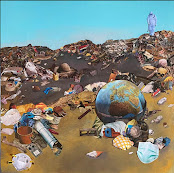DESMA9 U7- Emilie Wouters
U7: Neurosci + Art
This week, the reading I’d like to discuss is the one about Jonah Lehrer. Memory is an interesting topic of neuroscience. It varies between people, it’s pretty unreliable, and there are so many things that can positively or negatively affect it. Its unreliability can be dangerous in the case of modified memories, and when dealing with manipulation and gaslighting, but the article doesn’t go into depth for those two things. On a personal note, I have a few mental illnesses that affect my memory, so I do try to learn as much as I can about it when I can. Lehrer studied both English and neuroscience, and this crossover proved to be a good one. Remember the third culture from Unit one of the DESMA class? Well, Lehrer perfectly mixes literature and neuroscience. He discovered that writers/musicians lead scientific discoveries with inspiration, and scientists follow up with tests and experiments. Art can teach us about our brains. Now, the article mentions something that I have looked into: the role of taste and smell in memory. These two senses get carved into your memory like no other.
Have you heard of the study technique that says to have a distinct smell or taste when studying, and when you need to recall, you smell or taste the same thing? Or have you ever taken a deep breath and it smells like a specific experience and takes you right back to that memory? Or like in Ratatouille, when Anton Ego takes a bite of ratatouille, he is immediately transported to his childhood? All of these are in direct reference to the power taste and smell have on memory. If I want to remember a moment in time, after seeing it with my eyes, I close them, take a deep breath, and focus on my other senses, so that any remotely similar feeling can take me back. Otherwise, that memory is lost forever (if I don’t have a picture of it). The recall is quite the experience, it can hit you like a truck or just faintly appear in the back of your mind.
References:
Anton Ego flashback taste recall https://i.pinimg.com/originals/15/3c/59/153c5987241d3e3a639f9ebff41dc6e2.jpg Image.
Oddly specific universal experience smell recall https://i.pinimg.com/originals/b0/4c/c8/b04cc81e65f55fd1f2e116de64f0b2fe.jpg Image.
“Here's Why Smells Trigger Such Vivid Memories.” Discovery, www.discovery.com/science/Why-Smells-Trigger-Such-Vivid-Memories.
Max, D. T. “Swann's Hypothesis.” The New York Times, The New York Times, 4 Nov. 2007, www.nytimes.com/2007/11/04/books/review/Max-t.html.
Melina Theodorou Associate Editor and Career Expert, and Melina Theodorou Associate Editor and Career Expert Melina is our in-house career writer and student life expert. She is focused on providing students and recent graduates with helpful insight into applying to uni. “10 Incredibly Useful Memory Techniques for Studying.” CareerAddict, 8 Mar. 2021, www.careeraddict.com/memory-techniques-studying.
MI;, Miranda. “Taste and Odor Recognition Memory: the Emotional Flavor of Life.” Reviews in the Neurosciences, U.S. National Library of Medicine, pubmed.ncbi.nlm.nih.gov/23072843/.
Richardson, Michael W. “Savor the Moment: The Peculiar Connection Between Taste and Memory.” BrainFacts.org, www.brainfacts.org/thinking-sensing-and-behaving/learning-and-memory/2015/taste-and-memory.
Snow, C.P. The Two Cultures: And a Second Look. N.p.: n.p., 1963. Print.



Comments
Post a Comment